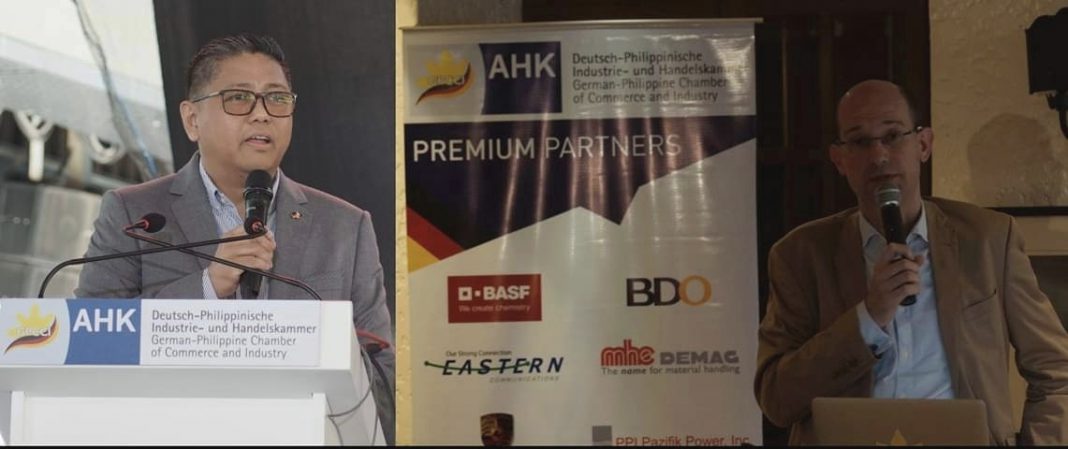German firms stay bullish in PH market
despite local, global challenges – survey
By THEPHILBIZNEWS STAFF
There’s no stopping the bullish performance of German companies in the Philippine market despite local and global challenges, a recent survey revealed.
On Tuesday (June 25), the German-Philippine Chamber of Commerce and Industry (GPCCI – AHK Philippinen) released its five-year assessment titled, “The Philippines: An Analysis – AHK World Business Outlook Survey 2015 – 2019.”
GPCCI’s findings contained in the annual review for the 2019 AHK World Business Outlook Survey showed that the Philippines remains an attractive market for German companies despite local economic policy, uncertainty, and global challenges.
While this gives the Philippines a positive edge to keep German investors interested in doing business in the country, there are some areas that need improvement.
In a statement sent to THEPHILBIZNEWS, GPCCI said: “Although the figures stay high, the results on the expectations in the areas of business development, investment intentions, and general economic development show a downtrend from last year (2018) by 8%, 6 % and 8%, respectively.”
The GPCCI explained that the underlying issues in the local setting are “the impending changes in the corporate income tax and fiscal incentive structure; the progression of the security of tenure bill; and other interventions that have adverse effects to regular business activities (e.g. in the field of medicine pricing).”
External factors
The study also points to factors in the general global environment, such as the growing trade tensions between the US and China.
“(This issue) shows its spill-over effects (on the Philippines) when it comes to the expectations of the companies in the German-Philippine trade relations, the GPCCI said.
Economic policies
The businesses involved in the German-Philippine economic relations continue to see various challenges for their engagement in the Philippines. About 46 percent of respondents still account that economic policies will have a strong influence on their business in the next 12 months.
Exchange rate volatility comes in second at 36 percent, although its importance has lost 10 percent compared to last year.
Sharing the third place (34%) are challenges in securing skilled labor and potential changes in domestic and international market demand. Noticeably, the worries on the latter have almost doubled in the last two years.
Meanwhile, concerns on infrastructure seem to have lost momentum from the past years as the government’s “Build, Build, Build” program – with planned investments of up to USD 160 billion – shows its initial results.
Another important factor concerns about increasing inflation rates in the country by which 70 percent of the total respondents sees a high impact.
Meanwhile, the importance of the availability of skilled workers particularly in technical fields on university, as well as on vocational training level, almost doubled from 2017 to 2018 remaining on a high plateau with 45 percent this year.
With regard to a potential EU-ASEAN Free Trade Agreement, companies continue to emphasize the important influence of such an enhanced cooperation between the two economies.
Recommendations
In line with the results of the survey, GPCCI President Tristan Arwen “Bobbit” Loveres stated: “The GPCCI survey clearly shows that the pending reforms have to be finalized by the government. They need to create a business- and investor-friendly environment.”
The discussion of the TRABAHO bill should take into account the concerns of the industry to create an attractive incentive and fiscal structure for both existing and incoming firms. Expediting the lowering of the corporate income tax rate is one of the elements that would immediately contribute to Philippine competitiveness in the ASEAN region.
Furthermore, the chamber reiterates that all necessary measures need to be taken for the fast implementation of the Ease of Doing Business Act.
Finally, GPCCI refers to the proposals of the government to substantively relax the restrictions on foreign investments in the country. Amending the retail trade liberalization act and the foreign investment act as well as redefining the public service act will increase foreign investment and bring in more competition and new technologies in the country.
“The economic shifts and developments bear much more opportunities than risks for the German-Philippine economic relations, particularly if the government immediately promotes a strong business-friendly agenda,” said GPCCI Executive Director Dr. Martin Henkelmann.














